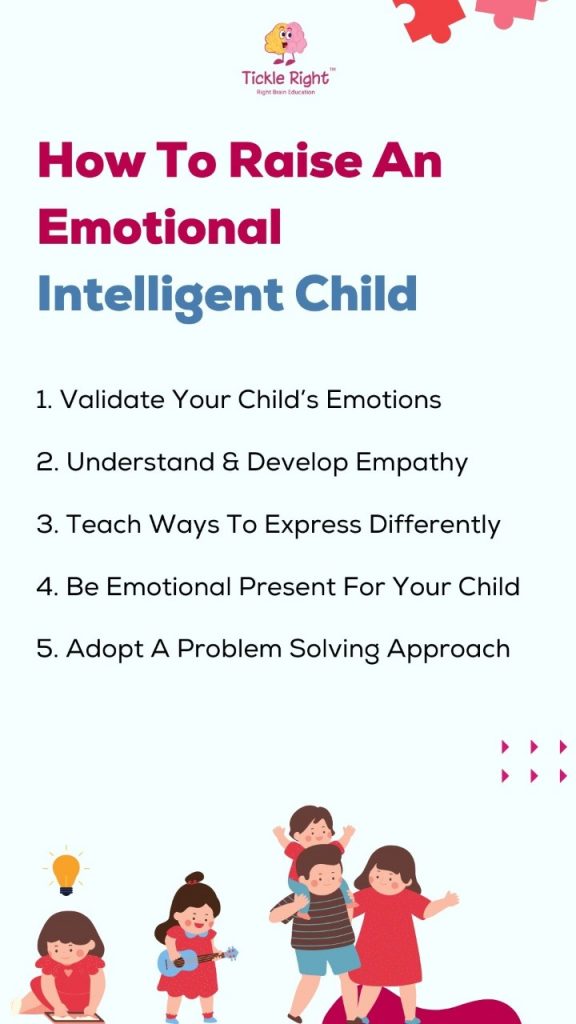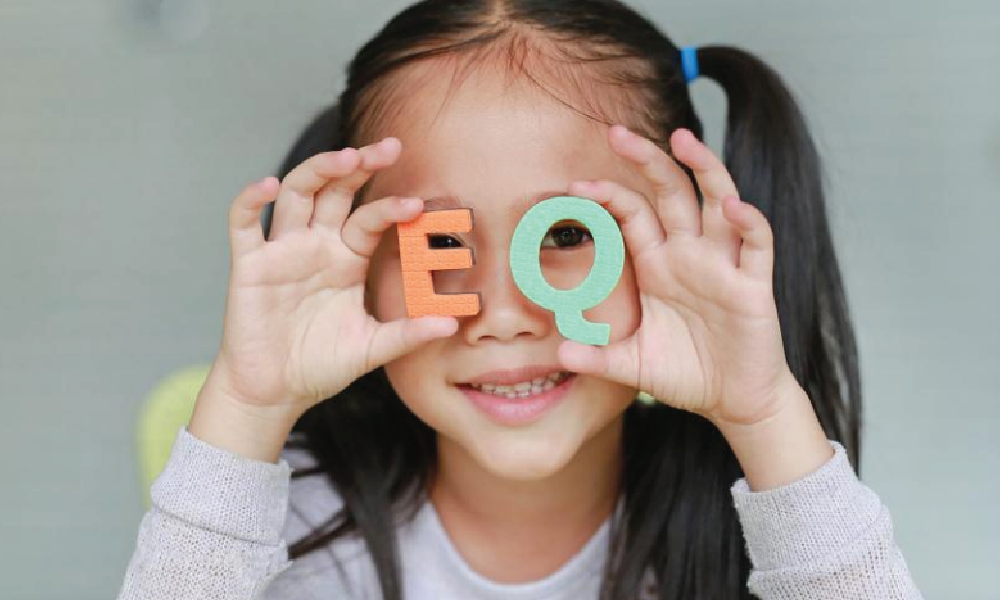5 Tips To Raise An Emotionally Intelligent Child
5 Tips To Raise An Emotionally Intelligent Child
As per the normal conventions, emotional intelligence can be naturally inculcated in adulthood. But is it right to wait for it to happen organically so late? It sparks a child’s best interests at heart. Both academically & non-academically. It is the means by which children learn to manage & express emotions while developing empathy. It can be learned at any age.
However, learning emotional intelligence skills at a young age has its own set of perks. Its benefits can be compared with those of terrific educational advantages. It is a way for your child to learn to manage their feelings & respect others as well. It is as important as developing an IQ, where children are staging themselves as the best in all the fields.
Raising a child from an emotional intelligence perspective helps them get placed in society. It also helps develop confidence & makes a child emotionally aware & intelligent. We at Tickle Right believe that all children have the potential to learn such skills to validate each other’s feelings for good.
What Is Emotional Intelligence For Kids?
Emotional Intelligence (EQ) is the process of managing & expressing feelings while not overlooking others’ emotions. It demands from a child to respect others’ emotions accurately with emotional self-regulation duly. As parents, you can associate such skills with the ability to guide your child’s emotions. It’s crucial to teach your child to manage anger or any other unpleasant emotional challenges. Validating your child’s emotions in such cases helps them soothe their intense emotions. This becomes a means by which your child finds an optimistic pathway. It is to relieve negative emotions & communicating them effectively to you.
Why Is Emotional Intelligence Important For Children?
Emotional Intelligence lays the bedrock for cognitive & emotional converge. It taps into a child’s potential to develop empathy, logical understanding, stress tolerance, & handle conflicts. It helps perceive what others think about a particular situation & respond accordingly. The following are the varying benefits of acknowledging emotional intelligence at a growing age:
- Develops strong relationships
- Inculcates stress tolerance
- Builds empathy towards others
- Resolves conflicts & quarrels
- Communicates effectively
- Understand & manage emotions
- Fosters self-controlling mechanisms
- Wholesome well-being & high IQ
How To Raise An Emotionally Intelligent Child?
Raising an emotionally intelligent child who can take on challenges or conflicts headway takes time. Your child may not be born with such skills but can gain them duly. It is only possible by validating their emotions & helping them express themselves in a healthy way. Because a child feels as intensely as adults.
It’s important to give your child enough time to process emotions. Beginning rightly from crying for unreasonable wishes to anger tantrums. Building emotional intelligence can help your child to talk about such instances in their own way. It can be both via a verbal & non-verbal communication methods.

1. Validating Your Child’s Emotions
The ability to understand your child’s complex emotions helps deal with them accurately. As a parent, you must not dodge your child’s feelings or get angry with them. This creates a bridge between your child & their willingness to communicate with you. Validating your child’s feelings by putting a label on them can mend things easily. Help your child understand what they’re going through – anger, disappointment, shyness, pain, & others. Instead of scolding your child, you must help them pacify these emotions. In fact, positive emotions like – happiness, excitement, and joy must be given attention for psychological goodwill.
2. Understanding & Developing Empathy
Being aware of others’ emotions is the best way to contemplate & empathize with them. The ability to emotionally understand what others are going through helps build better relationships. It’s a finer approach for your child during tricky times. Whenever your child is going through a negative outburst, make sure that your child knows that you’re present for them. Because as they grow up, they often set up their foot in different environments like a school. They meet other kids and build human relationships. At this point, you must speak to your kid about their new interactions. Make them emotionally aware of any unresolved feelings or issues on their mind.
3. Teach Ways To Express Differently
There are several alternative ways to make sure that your little one understands different feelings. Music, art, movies, reading books, and extracurricular activities are more than a means of amusement & interest. It helps express different emotions in a creative appropriate way. When your child reads a story, the underlying message helps them understand the right response to a particular situation. Similarly, while watching a movie, a child engages with healthy drama. This pushes them to brainstorm about different characters & teach coping skills. You can also put up questions related to a character’s feelings. You can help your child be more socially & emotionally aware.
4. Be Emotionally Present For Your Child
As parents, it’s your first duty to be emotionally & physically present for your child. This is an ongoing job that requires constant observation of your child’s actions. That’s because there is always a scope for improvement when it comes to building emotional intelligence. Your child may appear to be socially perfect, but it’s important to understand their in-depth feelings too. Initiating conversations about experiences that make them feel secure with you gives them a sense of fulfillment. Every child will go through their own ups & downs, but what matters is you being there for them. Your child will need special assistance at times.
5. Adopt A Problem-Solving Approach
Helping your child learn how to fix problems is a great skill to acquire duly. The ability to identify a problem & figuring out how to solve it makes your child an actual problem solver. For this, it’s important that your child is socially aware of their surrounding. Assessing a particular situation to everyone’s advantage can help solve a problem peacefully. Helping your child to stay calm during an emotional burst helps them feel accepted. It’s important that you do not neglect their feelings. Instead, teach your child to manage their feelings without striking their peers.
FAQs
-
What are the 5 characteristics of emotional intelligence?
The following are the 5 characteristics of emotional intelligence that power your child’s emotions. They help gain control & the necessary behavioral makeup to perceive emotions accurately.
- Self-Awareness – The ability to understand your own emotions
- Self-Regulation – The ability to assess one’s negative emotions
- Motivation – The ability to self-motivate for internal grace
- Empathy – The ability to identify & understand other’s emotions
- Social Skills – The ability to connect & bestow emotional understanding
-
What are emotional intelligence examples?
Emotional Intelligence has proven to play a great role in developing a child’s cognitive behavior. You can look for the following signs in your child as an example:
- Your child will be able to express their emotions
- Your child will participate in active listening practices
- Your child will often regulate their disruptive behavior
- Your child will talk to you about other’s feelings & emotions
- Your child will be able to accept criticism & face challenges
-
What activities can help a child’s emotional development?
Play-based learning provides an in-depth setup to practice managing strong emotions. The management of these feelings can be taught via developing empathy & promoting activities like:
- Listening to music
- Demonstrating art skills
- Reading daily on routine
- Practice yoga to manage stress
- Expanding the feelings vocabulary
- Playing games together
Takeaway
Your child needs all the emotional support in the world at each age group. Discussing with them the importance of sharing, developing empathy, & expressing feelings is crucial. Your child must not fear emotions. Instead, help them develop an understanding of these emotions. You can do this by the means of right-brain activities & by simply being present for your little one. This will help develop logical reasoning in your child’s mind & create a positive impact on their behavior.

